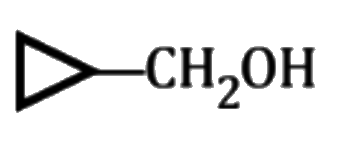Which of the following alcohols do not give white turbidity on treatment HCl/ZnCl2?
CH3CH2OH

N≡C−CH∣CH3−OH
(CH3)3COH
The correct Answer is:C
To determine which alcohols do not give white turbidity when treated with HCl and ZnCl₂ (known as Lucas reagent), we can analyze the reactivity of different types of alcohols (primary, secondary, and tertiary) with this reagent.
1. Understand the Lucas Test: The Lucas test is used to differentiate between primary, secondary, and tertiary alcohols based on their reactivity with Lucas reagent (HCl/ZnCl₂). Tertiary alcohols react quickly, forming a cloudy solution (white turbidity), while secondary alcohols react more slowly, and primary alcohols do not react significantly.
2. Identify the Types of Alcohols:
- Primary Alcohols: These have one alkyl group attached to the carbon bearing the hydroxyl (-OH) group. They generally do not produce turbidity with Lucas reagent.
- Secondary Alcohols: These have two alkyl groups attached to the carbon with the -OH group. They produce turbidity more slowly than tertiary alcohols.
- Tertiary Alcohols: These have three alkyl groups attached to the carbon with the -OH group. They react quickly and produce a significant amount of turbidity.
3. Evaluate the Given Options:
- Option A: Identify if it is a primary, secondary, or tertiary alcohol. If it is primary, it will not give turbidity.
- Option B: Check if it is secondary. If it is secondary, it will give turbidity.
- Option C: Check if it is secondary. If it is secondary, it will give turbidity.
- Option D: Identify if it is tertiary. If it is tertiary, it will give turbidity.
4. Conclusion: Based on the analysis, the primary alcohol is the one that does not give white turbidity when treated with Lucas reagent. Therefore, the answer to the question is the primary alcohol from the options provided.
Final Answer:
The alcohol that does not give white turbidity on treatment with HCl/ZnCl₂ is the primary alcohol.
---
- Primary Alcohols: These have one alkyl group attached to the carbon bearing the hydroxyl (-OH) group. They generally do not produce turbidity with Lucas reagent.
- Secondary Alcohols: These have two alkyl groups attached to the carbon with the -OH group. They produce turbidity more slowly than tertiary alcohols.
- Tertiary Alcohols: These have three alkyl groups attached to the carbon with the -OH group. They react quickly and produce a significant amount of turbidity.
- Option A: Identify if it is a primary, secondary, or tertiary alcohol. If it is primary, it will not give turbidity.
- Option B: Check if it is secondary. If it is secondary, it will give turbidity.
- Option C: Check if it is secondary. If it is secondary, it will give turbidity.
- Option D: Identify if it is tertiary. If it is tertiary, it will give turbidity.
The alcohol that does not give white turbidity on treatment with HCl/ZnCl₂ is the primary alcohol.
Similar Questions
Knowledge Check
Which of the following alcohols do not give white turbidity on treatment with HCl/ZnCl2 ?
ACH3CH2OHB CN≡C−CH∣CH3−OHDCH3−CH3∣C∣CH3−OH
CN≡C−CH∣CH3−OHDCH3−CH3∣C∣CH3−OHWhich of the following alcohols will not give iodoform test ?
A BCH3−CH2−OHC
BCH3−CH2−OHC D
D
Which of the following can give immediate turbidity on treatment with Lucas Reagent?
View SolutionWhich of the following alcohols is expected to give haloform test ?
View SolutionWhich of the following amines, can give N-nitrosoamine on treatment with HNO2?
View SolutionWhich of the following compound gives yellowish white turbidity with dil. H2SO4?
View SolutionWhich of the following compounds will give N2(g) on treatment with HNO2
View SolutionAmongst the following alcohols which would react fastest conc. HCl and ZnCl2 ?
View Solution